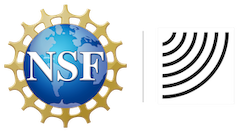
LISA Pathfinder image (brochure)
Congratulations LISA Pathfinder!
News Release • June 7, 2016
LIGO laboratory congratulates everyone involved with the LISA Pathfinder mission on its successful demonstration of the technology needed to build a space-based gravitational wave observatory. According to LIGO Lab Director David Reitze "The LISA Pathfinder results announced today are a spectacular confirmation that is possible to achieve the measurement precision needed for detecting gravitational waves in space. LISA will explore a completely different region of the gravitational wave spectrum and inform us about supermassive black hole mergers and other astrophysical phenomena inaccessible to LIGO."
LISA Pathfinder was built to test many of the key technologies that will be used in a space-based gravitational wave detector. Such detectors will complement LIGO’s ground-based efforts, as space-based detectors will detect a very different frequency range of gravitational waves.
While LIGO has shown it can detect high frequency gravitational waves – such as those emanating from stellar black holes merging – it has trouble detecting low frequency gravitational waves. A space-based interferometer will detect low frequency events – such as the mergers of supermassive black holes at the center of galaxies. Put in other terms: LIGO detects high pitch gravitational waves (think dog whistles and sopranos), while a space-based interferometer will detect low pitch gravitational waves (think whale songs and bass sounds).
Although a space-based observatory is still years away, LISA Pathfinder’s early success is good news for the field of gravitational wave observing. According to LISA Pathfinder Senior Scientist Martin Hewitson, “The performance of the (LISA Pathfinder) laser interferometer has already surpassed the level of precision required by a future (space-based) gravitational-wave observatory by a factor of more than one hundred,” which indicates that many of the technological hurdles have been solved in order to create such an observatory. A space-based observatory would work in tandem with ground-based observatories such as LIGO to increase our knowledge of the universe.
The European Space Agency (ESA) is pressing forward with plans to realize a space-based detector, and NASA is planning on participating in the ESA mission.
LISA Pathfinder’s team published the results of their tests in Physical Review Letters.




